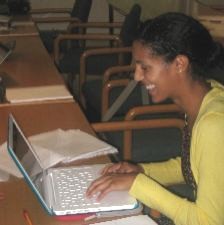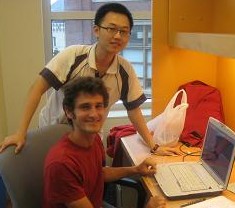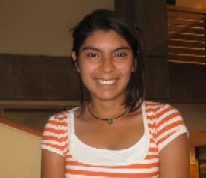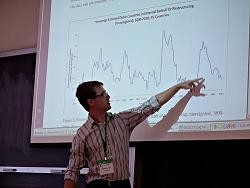|
Students
participating in the 2013 Program
Reza Asad, Toronto
John Campbell, York
William Cook, Cambridge
Malors Emilio Espinosa-Lara, Guanajuato-CIMAT
Mark Freeman, Harvard
Jonathan Herman, Western Ontario
Junrui (Thomas) Hu, Western Ontario
Boris Kadets, Kharkiv National
Vladyslav Kalashnyk, Kharkiv National
Xinyu Li, Minnesota, Twin Cities
|
James McVittie, Toronto
Meghan Miholics, McMaster
Alexander Molnar, Queen's
Jiewon Park, Seoul National
Ashwath Rabindranath, Princeton
Nigel Sequeira, McMaster
Paul Sacawa, Toronto
Iryna Sivak, Taras Shevchenko National University
of Kyiv
Yihui Tian, Toronto
Kimsy Tor, Manhattan College
Junho (Peter) Whang, Queen's
|
LIST
OF PROJECTS
Note: projects will be presented by supervisors
on the first day of the program.
Students will ballot their top three choices of project, and
can expect to be in your first or second choice.
Project
1 - Modular forms around string theory
Supervisor: Noriko Yui (Queen's University)
Description:
This project will include topics ranging from modularities
of Galois representations, potential modularity of families
of Calabi-Yau varieties, arithmetic and geometry of K3 surfaces
and Calabi-Yau threefolds, geometric modularity of families
of Calabi-Yau varieties, Mathieu/K3 moonshine, automorphic
black hole entropy, physicial implications of special values
of L-functions of Calabi-Yau varieties.
Modular
forms and more generally automorphic forms appear in various
places in string theory landscape. Some are more traditional
than others. For instance, the modularirty or automorphy
of Galois representations of Calabi-Yau varieties defined
over number fields is one of the most prominent open problem
in modern number theory, known as the Langlands Philosphy.
For geometric modularity question, we aim to describe moduli
spaces of K3 surfaces and Calabi-Yau threefolds in terms
of some modular invariants.
The other modularity problems stem from string theory. Often,
generating functions of counting some physical quantities
turn out to have modular properties. These include Gromov-Witten
invariants, Donaldon-Thomas invariants, wall-crossing numbers,
and most recently, black hole microstate counting, etc,
where various modular forms (elliptic modular forms, Siegel
modular forms, and automorphic forms) enter the scene. To
enhance our understanding why modular forms play prominent
roles in string theory will be one of our main goals.
*Course information for
Project Participants*
Project 2 - The spatio-temporal
spread of social media
Supervisor: Jianhong Wu (York University)
Project Presentation slides
Description:
This project aims to examine simple differential equations
to characterize the spatiotemporal patterns of diffusion
in online social networks using established mathematical
methodologies for biological invasion in ecology, and to
adapt the modern theory of mathematical epidemiology to
quantify the influence and transmission dynamics of news
along social networks.
Modular
forms and more generally automorphic forms appear in various
places in string theory
landscape. Some are more traditional than others. For instance,
the modularirty or automorphy of Galois representations
of Calabi-Yau varieties defined over number fields is one
of the most prominent open problem in modern number theory,
known as the Langlands Philosophy. For geometric modularity
question, we aim to describe moduli spaces of K3 surfaces
and Calabi-Yau threefolds in terms of some modular invariants.
The
other modularity problems stem from string theory. Often,
generating functions of counting some physical quantities
turn out to have modular properties. These include Gromov-Witten
invariants, Donaldon-Thomas invariants, wall-crossing numbers,
and most recently, black hole microstate counting, etc,
where various modualr forms (elliptic modular forms, Siegel
modular forms, and automorphic forms) enter the scene. To
enhance our understanding why modular forms play prominent
roles in string theory will be one of our main goals.
Project
3 - Logic and operator algebras
Supervisors: Ilijas Farah (York University) and Bradd Hart (McMaster
University) 
Project Presentation Slides
Reading
list and resources
Description: This project will explore the growing interactions
between set theory and model theory, both branches of mathematical
logic, and the study of operator algebras - algebras of
linear operators acting on a Hilbert space. A wide variety
of logical tools can be brought to bear from descriptive
set theory, forcing and continuous model theory - all subjects
to be studied during the project. For example, we will we
will study the structure of C*-algebras from the point of
view of mathematical logic and consider questions related
to the asymptotic behaviour of matrix algebras.
Some
familiarity with basic logic would be helpful and a solid
grounding in linear algebra and analysis would be an asset.
Project
4 - Dynamical Systems Models in Macroeconomics
Supervisor: Matheus Grasselli (McMaster University)
Project
Presentation Slides
Description: The role of the financial sector is poorly
understood in DSGE (Dynamic Stochastic General Equilibrium)
models, the dominant paradigm in modern macroeconomics.
This project will attempt at a systematic review of several
alternative modelling approaches, primarily based on dynamical
systems. These include the well-knonw Goodwin model, a predator-prey
system describing the wage share and employment rate, and
several of its extensions incorporating banks, households,
governments, foreign sectors, etc. An overarching theme
throughout the project is the endogenous fragility created
by cycles of leverage and deleverage and the corresponding
periods of bubbles and crashes. Students are expected to
summarize and compare the mathematical properties of different
models (equilibria, local stability, bifurcation, etc),
address possible inconsistencies, identify open problems,
and hopefully obtain new results.
No
previous knowledge of finance or economics beyond basic
concepts is required, but a strong foundation in differential
equations, linear algebra and probability is essential.
PROGRAM
Activities start July 2, 2013 at 9:30 a.m. at the Fields Institute,
222 College Street. Map to Fields
If you are coming from the Woodsworth residence, walk south
on St. George to College Street, turn right, Fields is the
second building on your right.
| Week
of July 2-5 |
|
Jul
2
|
|
|
9:30
a.m.
|
Introductory
Session: Introduction and presentation of the program
(Fields Deputy Director, Matheus Grasselli)
Introduction to supervisors, and overview
of theme areas and projects |
|
11:00
a.m.
|
Coffee
break |
|
11:30
a.m.
|
Open
time for students to meet informally with supervisors.
|
|
12:30
p.m.
|
Lunch
provided at Fields for students and supervisors |
| 2:30
pm |
Orientation
Meeting: Students meet with Fields program staff
Re: computer accounts, offices, expense reimbursements,
and overview of Fields facilities. |
| 3:00
p.m. |
Fields
Tea break |
|
|
Open
time |
|
4
p.m.
|
*By
Hand in ranking sheet*
|
|
Jul
3-5
|
Students
will meet informally with supervisors and in their groups
to work on research project. |
| Week
of July 8-12 |
| |
Students
will meet informally with supervisors and in their groups
to work on research project. |
| Week
of July 15-19 |
| |
Students
will meet informally with supervisors and in their groups
to work on research project.
Introduction to the Fields SMART board and video conferencing
facilities which are useful for remote collaboration.
|
| Week
of July 22-26 |
| |
Students
will meet informally with supervisors and in their groups
to work on research project.
|
| Week
of July 29-August 2 |
| |
Students
will meet informally with supervisors and in their groups
to work on research project. |
| Week
of August 6-9 (Note Aug.5 is a Civic Holiday) |
| |
Students
will meet informally with supervisors and in their groups
to work on research project. |
| Week
of August 12-16 |
| |
Students
will meet informally with supervisors and in their groups
to work on research project. |
| Week
of August 19- 23 |
| |
During
the final week, students are requested to prepare a report
on their projects and their experience in the Program
to be emailed to "
programs(PUT_AT_SIGN_HERE)fields.utoronto.ca
" before August 23. These reports will be used in
the Fields Newsletter and Annual Report. |
|
Aug
21
|
Mini-Conference:
Undergraduate research students will present their work.
|
|
Aug
22
|
An
excursion - sponsored and organized by Fields - is planned
for all students. |
Back
to top
|